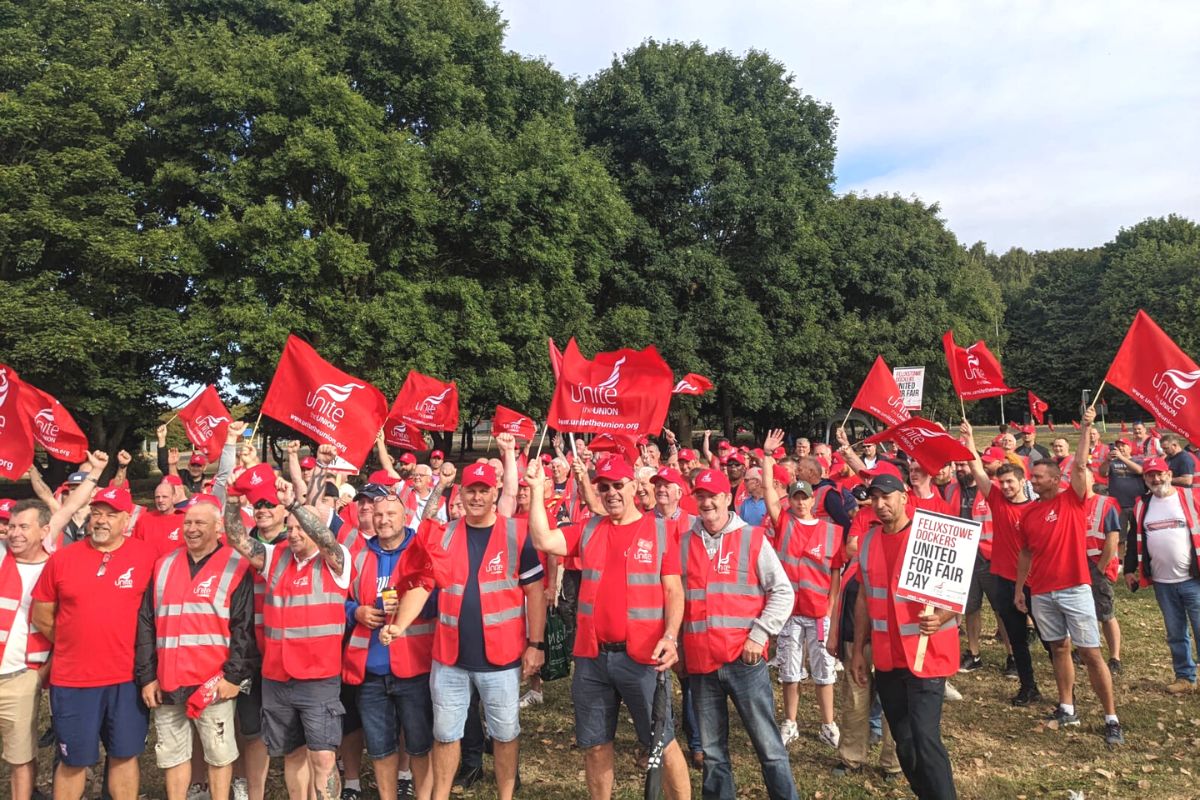Hundreds of dock workers have brought Britain’s busiest port to a standstill, in a dispute over pay. This shows the potential power that workers hold – a power that must be harnessed through militant struggle for a bold socialist alternative.
On 21 August, for the first time since 1989, over 1,900 workers at Felixstowe port walked out, beginning eight days of continuous strike action, in a struggle for a real pay rise.
Following months of talks between Unite the Union and the Felixstowe Dock and Railway Company, the bosses offered workers an anaemic 7% pay rise – well below the current rate of RPI inflation, which hit 12.8% in July.
This offer was only adding insult to injury. The previous year’s pay ‘rise’ saw workers receive a wage increase of just 1.4%.
Following the latest offer, dock workers – organised in Unite – secured a monumental 92% vote in favour of strike action, on an 81% turnout. This demonstrates the determination to fight back amongst these vital workers.
Impact

The Port of Felixstowe is the UK’s busiest container port, receiving 48% of all shipping containers that enter the country.
As a result, the current strike action is predicted to cause major disruptions to supply chains and trade, which have already suffered from a series of knocks and shocks in recent years: from Brexit to the pandemic.
Analysing previous trade flows, business consultants at the Russell Group predicted that this industrial action could result in over £800 million in trade being disrupted over the eight-day strike period.
“Strike action will cause huge disruption and will generate massive shockwaves throughout the UK’s supply chain,” stated Unite’s national officer for docks, Bobby Morton. “But this dispute is entirely of the company’s own making. It has had every opportunity to make our members a fair offer, but has chosen not to do so.”
Despite the huge impact to business this will have, Felixstowe bosses were quick to downplay the impact of the strike. One representative bitterly stated that the strikes would simply be an “inconvenience, not a catastrophe”.
In any case, even a short-term dent to profits will not exactly bankrupt the incredibly-wealthy Felixstowe Dock and Railway Company. In 2020 alone, for example, the firm amassed pre-tax profits of £61 million.
In this same year, parent company CK Hutchison Holdings Ltd., which is registered in the Cayman Islands, paid out £99 million to its shareholders.
They are obviously not short of the cash needed to increase workers’ pay – especially given the fact that, as this strike has shown, it is workers and their labour who create all this wealth in the first place!
Instead of offering their workers a fair deal, however, port authorities have asserted that they are taking measures to mitigate the effects of the strike, and that daily throughput would depend on the number of employees that show up.
Solidarity
The first day of strike action saw the normally-bustling port fall silent, as hundreds of Unite members formed a picket line on a roundabout opposite the main entrance.
When asked about how much work was still being completed inside the port, one dock worker told Socialist Appeal supporters:
“We’re hearing, through the contacts we have, that we’ve had 21 people turn up. This is out of round about 500 that would usually turn up on a normal shift day. So there might be some work being completed, but it’ll be very, very little.”
Enthusiasm amongst the workers was high, as was support from the public. In an act of solidarity, workers at a local McDonald’s store even donated bags of burger buns for the workers’ impromptu BBQ.
The world’s largest container ship, the Ever Alot, capable of transporting over 24,000 containers, could be seen docked in the harbour, full to the brim with unloaded cargo.
Each of the port’s cranes were left unoperated and in the raised position. As a result, many shipping containers have opted to divert course and seek alternative ports around Europe.
But solidarity from workers abroad may prove to make this difficult. The Felixstowe strikers said that they had received messages of support from workers across Europe. Dutch, American, and Australian dock workers, meanwhile, have all stated they will not handle cargo coming from Felixstowe during the strike.
Threats

On the morning of 21 August, several Felixstowe bosses sauntered out to the picket line to speak to the workers. This included CEO Clemence Cheng and Finance Director Simon Mullett, who claimed that “there’s a lot more to lose than there is to gain” by taking strike action.
This could be a reference to alleged threats that were made to those workers still on the so-called ‘green contract’: a pre-2014 contract with better pay and conditions, which could be revoked should these workers strike.
This is a classic attempt by the bosses to divide the workforce and weaken the strike.
Employers at the Port of Felixstowe were also reportedly warned by the Bank of England (BoE) prior to the strike action about the “inflationary effects of big pay rises”.
It appears that BoE chiefs are intervening in industrial disputes, pedalling the ruling class’ myth of a ‘wage-price spiral’. In truth, however, it is wages that are chasing after prices, not vice-versa. And all the while, big business is making eye-watering profits.
“Since the pandemic, the FTSE top 350 have seen profits soar by 43%,” noted Unite General Secretary Sharon Graham. “Britain has a profiteering crisis – when is something going to be done about that?”
United action

Dock workers elsewhere in Britain are also reaching breaking point. More than 500 stevedores at Liverpool’s Peel Port, also organised in Unite the Union, recently voted to take strike action, for example.
Given how important these workers are for the economy, they hold an enormous potential power in their hands – a power that could be fully realised and harnessed, if deployed in conjunction with the rest of the labour movement, through militant united action.
This means coordinating strike action: not only across these two disputes, but linking the dockers’ struggle to those being fought by rail workers, posties, and many other workers moving into battle.
Such a movement would have a huge impact, and could turn the bosses offensive back against them.
Workers economy
Furthermore, it would then provide a platform for wider economic and political demands: for a sliding scale of wages, automatically linking workers’ pay rises to inflation; and for nationalisation of the major monopolies and big business that dominate the economy.
The current cost-of living-crisis is not going away anytime soon. Unless pay is tied to prices, workers will find themselves having to fight the same battle over wages in the coming months and years.
The trade unions must therefore fight not just for individual pay increases, but to end the anarchic, chaotic, profit-seeking system – capitalism – that forces workers to constantly struggle just to stay afloat.






